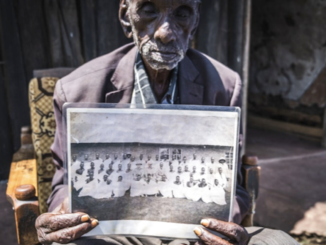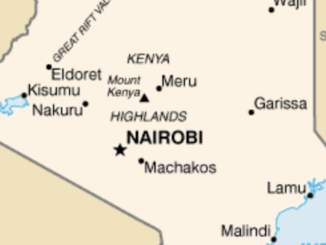The Home Guard is institutionalised at the National Police Service and is evident in the lives that have been claimed through state-sanctioned violence during the ongoing Gen Z protests.
14 August 2024

Nairobi riot police,
Open Democracy – Licence CC BY-SA 2.0
According to a 2013 IPOA baseline survey, a conservative estimate is that at least one in three Kenyans has experienced police harassment. However, every Kenyan who is not in the political class that I have asked, is familiar with the sinking sensation experienced at the sight of a slightly overweight policeman gleefully stalking towards you, notebook or AK-47 in hand, eyes hungry, chest out, reason gone! It is the quintessential Kenyan experience.
The current country-wide protests in Kenya, triggered by the Finance Bill 2024, have broadened the narrow scope of micro-aggressions commonly experienced by the middle class at the hands of the NPS. Rather than the usual classifications of police misconduct – “bribery”, “threats of imprisonment”, “frustrating acts of time wastage” – the last month has witnessed an exponential increase in assaults, abductions, falsification of evidence, and unwarranted killings. While the middle class is horrified by the sudden and explosive escalation of state-sponsored violence, the working poor are familiar with the spicy end of the police violence spectrum. They have borne the brunt of the cyclical political violence that has reared its ugly head every decade or so since Kenya’s inception in 1963. Simply, everyone who is a Kenyan is susceptible to some form of police violence; it is the expectation, it is the norm, and it is just the way it has been, without question, until now. Making no small sacrifice, Gen Z, through their protests, have bravely sought the root that feeds the fruit of state-sponsored violence.
The British colonial administration in this country was coercive in intent. Its objective was to keep the “natives” subdued enough for land occupation by White settlers and the quiet extraction of resources. The colonial government framed executive discretion as the law and transferred its attitude and structures to the Kenyan governments that followed. Even the promulgation of the 2010 constitution of Kenya has failed to exorcize the spirit of the coloniser from Kenyan policies, laws and the psyche of administration. An aversion to acting within the bounds of the rule of law and constant interference by the executive in matters of parliament and the judiciary is the governance birthright the colonists bestowed on their offspring governments.
Today, we see the spectre of “law as executive discretion” made manifest, in the super cabinet position occupied by Mr Musalia Mudavadi, the curtailment of constitutional rights and the accompanying policy processes that are patriarchal in attitude, self-centred in intent and destructive in effect.
In a kind of morbid mirroring of the past, the state-sanctioned violence of the 1953 state of emergency levelled against the Mau Mau uprising was an attempt to subdue a gathering of the disenfranchised and disaffected peasants without decision-making access. The Home Guard, who were carefully selected loyalists, were armed with rifles and pistols and set on fellow Kenyans to curtail the rebellion. They were rewarded by the colonial establishment for their violence and protected by their benefactors who tried to hide the excesses of the sinister, settler, state-sanctioned violence. At the Home Guard post, the dehumanisation of the Mau Mau through a war of propaganda encouraged the use of excessive, sadistic violence, and suppressed evidence. The full extent of the horrific torture and human rights violations that occurred in these internment camps are well documented and acknowledged by the British government.
Fast-forward to 2024 and it is clear that the spectre of the colonist still haunts the National Police Service. The shocking use of excessive force during the anti-Finance Bill 2024 protests to prevent the exercise of a constitutional right has led to the death of at least 50 young Kenyans. The dehumanisation of peaceful Gen Z protesters through the introduction of the “goon” narrative has, in the administration’s eyes, stripped young Kenyans of their rights, humanity and dignity. Now the NPS is not waging war against its children, it is protecting the “country” from goons with foreign funding, trying to overthrow the government. But what is a country without its youth?
It is important to note that Gen Z are also agitating for the rights of the NPS. The effects of the Finance Bill would have reverberated across classes, but the blue-collar civil servants were especially vulnerable. In addition, Gen Z protests enjoy popular support (86%) across most Kenyan demographics according to a recent Infotrack poll. It is, therefore, on the surface, baffling why the police would overzealously enforce orders to end demonstrations.
A stronger, more sinister motivation must compel these officers to act so decisively against their collective interest.
Fully aware of our sticky colonial inheritance, if the design purpose of the settler police and their faithful lackeys was to keep the natives in check, then the inherited purpose of the police service, in essence, is to maintain the status quo. The Kenya National Police wittingly or unwittingly still serve the foundational intent of the first colonial government. At recruitment, and similar to all public servants, the police are conditioned by a pervasive and insidious system with Pavlovian efficiency. Those who leave their integrity at home, question nothing and act in whatever way their superiors want, are rewarded with the opportunity to supplement their meagre incomes, travel and move up the ranks, incentivised and rewarded by a self-correcting system and organisational culture of proactive corruption, fear, intimidation and a relentless pursuit of political interests.
This noxious soil cultivates a police service that is a tool of the incumbent government, frustrated, treacherous and lacking accountability. It is almost impossible for a singular officer to resist this race to the moral bottom, but a critical mass acting in defiance of this system would unravel its perverse purpose. This is why the police, when faced with young Kenyans armed with a bottle, a flag and a phone, calling for good governance and accountability, act as if they are facing an existential threat. These young Kenyans threaten all they know, their modus operandi, their frame of existence.
The Home Guard is institutionalised at the National Police Service and is evident in the lives that have been claimed through state-sanctioned violence. It continues to resist the change that protesters are seeking. The Home Guard is the last line of defence, animating the vision of the coloniser by discrediting, suppressing and dehumanising the Gen Z-led movement for accountability and people-centred governance. History, however, smiles on the brave souls agitating for a better Kenya.
For Rex Masai, the fifty that are known and the innumerable that are not.
© Maryanne Nduati – policy analyst and the creator of the Coherence CheckTM Framework. With over 10 years’ experience in policy analysis, her main aim is to make the meaning and effect of legal instrument
Shared with author’s full permission
AW Kamau 2024



